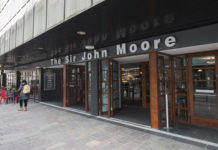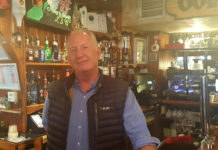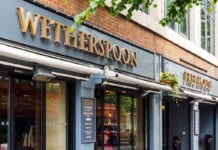Independents won’t follow Wetherspoon’s move, say operators

By Jack Walsh
PUBS giant JD Wetherspoon made headlines recently when it announced the closure of all its social media accounts, with immediate effect.
The company, which has almost 900 pubs across the UK and Ireland, including more than 65 in Scotland, said the decision to close every Facebook, Twitter and Instagram account associated with any Wetherspoon pub, as well as its head office, was due to “the bad publicity surrounding social media, including the ‘trolling’ of MPs and others, especially those from religious or ethnic minorities”.
The decision is also said to have been influenced by the “recent concerns regarding the misuse of personal data and the addictive nature of social media”.
Wetherspoon boss Tim Martin said at the time: “We are going against conventional wisdom that these platforms are a vital component of a successful business.
“I don’t believe that closing these accounts will affect our business whatsoever, and this is the overwhelming view of our pub managers.”
But is the pub chain in a unique position to make such a move? Some independent operators believe so.
Wes Taylor-Marriott of Inverness-based Johnny Foxes & The Den said it’s different for independent licensees.
“People know Wetherspoon is an institution; if people like us, as an independent – we’ve only got two premises, here and the Skiing Doo in Aviemore – so our boss is keen to get us out there and get us noticed,” he said.
“So social media has to be the way forward for us.”
In any case, Wes reckons it has become a crucial component of the pub’s marketing strategy; Johnny Foxes’ Facebook page has garnered over 8000 likes.
Stating that social media is “a big driver for us”, Wes said: “I would be very hesitant to withdraw from social media just because of the amount of business it’s generated for us.”
Nick Livingstone, who operates 7 Saints in Prestwick, believes Wetherspoon missed an opportunity when it closed down its social media.
“A corporate strategy on social media doesn’t work,” he said.
“People want something that’s fresh, that’s personal, that’s different and engaging.
“They’ve played it safe, instead of seeing it as an opportunity.”
And, according to Nick, whose bar’s Facebook page has over 18,000 likes, social media can be a powerful tool if there is a consistent message and brand.
For instance, with a different special featured every week via 7 Saints’ social feeds, Nick believes it pulls in both additional customers and sales. An example is the bar’s ‘Mexican Tray’, which, posted exclusively via social media, ‘reached’ over 123,000 people on Facebook and equated to around £3000 extra sales for the venue.
“We never even had signage in the venue, it was only on social media,” explained Nick, who said the right approach online is key.
“The difference is we have a brand identity, which is encouraged within the staff and the management; they’re given the freedom within those brand identity boundaries to communicate the way they see fit on social media – so things aren’t generic,” he said.
Milo Smith, of Ninety-Nine Bar & Kitchen in Aberdeen, reckons the likes of Facebook, Twitter and Instagram have “become an invaluable marketing tool at a time when everyone is looking for your money”.
Nick of 7 Saints said of those who think Wetherspoon’s decision to leave social media could be “the beginning of change”: “they’re absolutely wrong; social media is here to stay”.























